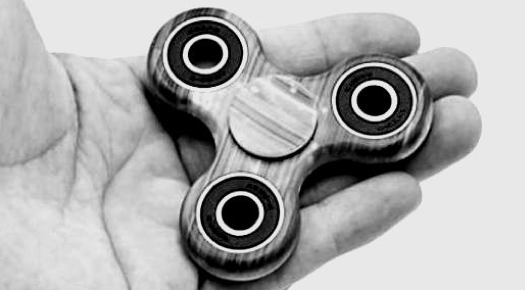
In Jewish law, food must be ritually cleaned and prepared in order to be kosher, or fit to eat. Today, it can also mean anything that is proper or legitimate. Rabbis at the Scientific and Technological Institute for Halacha in Jerusalem have faced a new challenge, to decide whether the latest must-have kids' toy is kosher or not. They have determined that the movement of fidget spinners does not violate the laws of Shabbat unless the spinner has lights that are triggered by its movement because an electrical charge may not be initiated by someone observing Shabbat.
However, children shouldn’t bring the spinners to synagogue services on Shabbat “in order not to harm the sanctity of the place, and certainly they must be careful not to play it during prayer and the reading of the Torah.” Also, playing with spinners during lessons, according to the institute “is disrespectful and disdainful of both the material and the rabbis and teachers.”
Catherine Hettinger, the creator of the toy, told the New York Post that the idea for the toy came as she saw young boys throwing rocks at police officers in Israel. In response to seeing that, she wanted to develop a soothing toy that could help children release pent-up energy and "promote peace."
Although they were invented in the 1990s, fidget spinners became a popular toy in 2017. Often marketed with health benefits as a way to help kids with anxiety, autism or attention deficit hyperactivity disorder (ADHD) keep themselves calm and focused in the classroom, the toy is now in the hands of school children. It resulted in some schools banning the spinners, arguing that the toy became a distraction in classrooms. Claims that the spinners help students pay attention aren't backed by science, experts say.
"To the best of my knowledge, there's no science behind what they're advertising," said Chicago psychiatrist Dr. Louis Kraus, chief of child and adolescent psychiatry for the Rush University Medical Center. Fidget spinners might benefit autistic children who use "sensory stimulation behaviors" to calm their anxiety, said Thomas Frazier, chief science officer at Autism Speaks. Unfortunately, the toys also could distract the kids from class work. Fidget spinners might best be used to reward children with autism for good behavior, Frazier said.
The fidget spinners look like a fan or helicopter and they are hand-held, so toys could get in the way of kids completing class work, said Dr. Andrew Adesman, chief of developmental and behavioral pediatrics at Cohen Children's Medical Center in New Hyde Park, N.Y.
Photo Credits: Cosmopolitan
